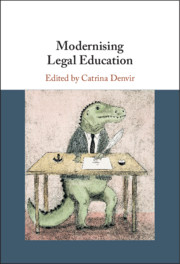Book contents
- Modernising Legal Education
- Modernising Legal Education
- Copyright page
- Contents
- Figures
- Tables
- About the Contributors
- Foreword
- Introduction
- 1 Do Lawyers Need to Learn to Code?
- 2 Experiential Legal Education
- 3 Skills Swap?
- 4 Scaling the Gap
- 5 Bringing ODR to the Legal Education Mainstream
- 6 Design Comes to the Law School
- 7 Developing ‘NextGen’ Lawyers through Project-Based Learning
- 8 Same As It Ever Was?
- 9 Ludic Legal Education from Cicero to Phoenix Wright
- 10 The Gamification of Written Problem Questions in Law
- 11 Virtually Teaching Ethics
- 12 Paths to Practice
- 13 ‘Complicitous and Contestatory’
- Afterword
- References
9 - Ludic Legal Education from Cicero to Phoenix Wright
Published online by Cambridge University Press: 30 December 2019
- Modernising Legal Education
- Modernising Legal Education
- Copyright page
- Contents
- Figures
- Tables
- About the Contributors
- Foreword
- Introduction
- 1 Do Lawyers Need to Learn to Code?
- 2 Experiential Legal Education
- 3 Skills Swap?
- 4 Scaling the Gap
- 5 Bringing ODR to the Legal Education Mainstream
- 6 Design Comes to the Law School
- 7 Developing ‘NextGen’ Lawyers through Project-Based Learning
- 8 Same As It Ever Was?
- 9 Ludic Legal Education from Cicero to Phoenix Wright
- 10 The Gamification of Written Problem Questions in Law
- 11 Virtually Teaching Ethics
- 12 Paths to Practice
- 13 ‘Complicitous and Contestatory’
- Afterword
- References
Summary
Game-based legal learning has emerged as a topic of intense interest over the last decade as a means of ‘modernising’ legal education, with game-based learning eliciting a wide range of responses from the legal academy. Somewhat unsurprisingly, resistance in the name of tradition has persisted. Yet, the view of game playing as a distinctly modern pedagogical development, and opposition on the basis of tradition is sheer folly. Ludic education has been the dominant teaching method for millennia, with legal game playing traced at least to the time of Cicero. Revealing the rich history of game playing in law, this chapter details ludic legal education from the declamation of Ancient Rome to Nintendo’s Phoenix Wright: Ace Attorney. It observes the way in which games can operate as a compelling delivery device for instruction, allow for experimentation, and encourage students to voice their opinions in a field where the sheer breadth of precedent and the relative impenetrability of legal texts may prove intimidating. In demonstrating the potential of game playing to overcome barriers to learning, this chapter considers the modern design principles that have enabled games to emerge as robust and enjoyable content delivery devices in legal education.
- Type
- Chapter
- Information
- Modernising Legal Education , pp. 166 - 185Publisher: Cambridge University PressPrint publication year: 2020
References
- 1
- Cited by

